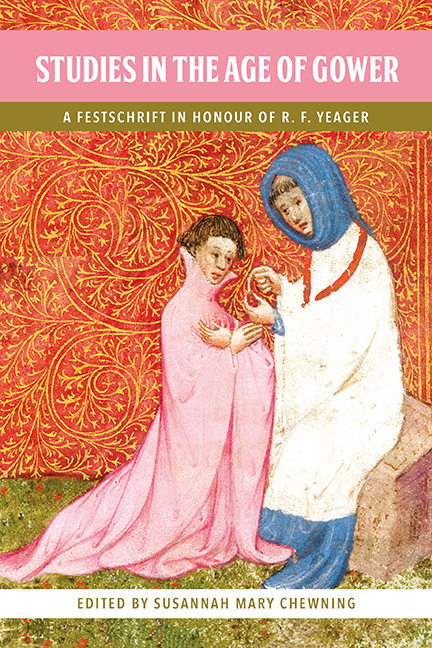Book contents
- Frontmatter
- Contents
- List of Illustrations
- Notes on Contributors
- Acknowledgements
- List of Abbreviations
- Introduction
- Part I Text
- Part II Gender
- Part III Time
- Part IV Spirit
- Part V Intersections
- A Personal Tribute to R.F. Yeager
- Bibliography of R.F. Yeager’s Writings
- General Bibliography
- Index
- Miscellaneous Endmatter
10 - Gower’s Light: The Ecology of “De Lucis Scrutinio”
Published online by Cambridge University Press: 28 April 2020
- Frontmatter
- Contents
- List of Illustrations
- Notes on Contributors
- Acknowledgements
- List of Abbreviations
- Introduction
- Part I Text
- Part II Gender
- Part III Time
- Part IV Spirit
- Part V Intersections
- A Personal Tribute to R.F. Yeager
- Bibliography of R.F. Yeager’s Writings
- General Bibliography
- Index
- Miscellaneous Endmatter
Summary
IN HER ANALYSIS OF James George's novel Ocean Roads, Elizabeth DeLoughrey asserts that “Radiation suggests a universal and global ecology that implicates the human and the nonhuman” even while conceding that light, traditionally a symbol for knowledge, “often exceeds the limits of representation and comprehension.” This seeming contradiction, the illuminating yet obscure nature of light, is not merely an aspect of the modernist technological environment, with its intrusive photographers and deadly nuclear devices, but a powerful attribute of the physical world through which most human beings move during any era of history. John Gower's “De Lucis Scrutinio,” a 103-line lyric poem written near the end of his career, is, in the words of R.F. Yeager, an “extended, sinuously adaptive metaphor of light and darkness” used to “attack … the worldliness of contemporary society.” An examination of this rarely studied poem reveals that Gower's light is penetrative, both physically and morally, highlighting the nature of medieval optical theory and evoking an ecology of light somewhat in concord with contemporary radiation ecology.
The history and development of medieval optics is fairly well known, and quite interesting for its fluidity, the shifting dynamic between the observer and the observed, an inheritance from the two major strands of optical theory extant in the middle ages, those loosely based on the theories of Plato in the Timaeus – often called extratransmissional – and those evolving from the theories of Aristotle – sometimes called intromission as a group. As is well-known, Plato believed that the eye sends forth its own light which meets and mingles with external light sources, such as the sun, to produce sight. Aristotle, in contrast, objects that such a theory would not explain why the eye cannot see in the dark and proposes instead that the eye, which is composed of water, a translucent material, receives an impression through the medium of air and water which impresses itself through the sensory organ and into the heart. The medieval commentaries, expansions and modifications of these two approaches, which include works by writers such as Robert Grosseteste, Avicenna, and Roger Bacon, are consistent in their resistance to a human objectivity, which would remove the human being from participation in the phenomenon under examination.
- Type
- Chapter
- Information
- Studies in the Age of GowerA Festschrift in Honour of Robert F. Yeager, pp. 161 - 172Publisher: Boydell & BrewerPrint publication year: 2020



